Putting out 'only' 100 lumens, the Knog Blinder V could be considered a little underpowered compared to the most powerful rear lights – but this misses the point.
The Blinder V uses chip-on-board (COB) technology to great effect, making the most of the lumens it has to play with.
Like its sibling, the Knog Blinder Road Rear 150, it features a somewhat exposed, built-in USB-A connector to facilitate charging, which may put some off.
Otherwise, it’s a sleek rear light if you can accept middling battery life.
Knog Blinder V rear light details and specifications
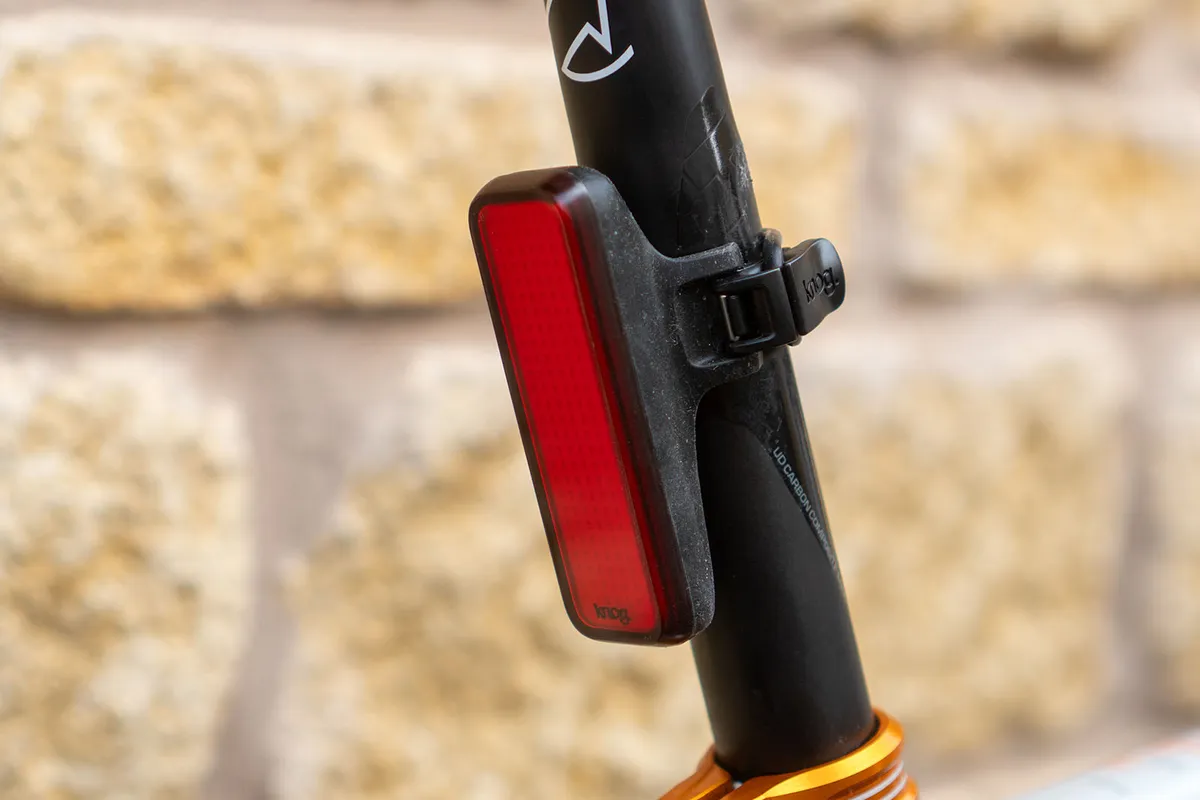
The Knog Blinder V is capable of delivering 100 lumens, via its COB LED design.
The COB LEDs essentially combine to form a full board of light, which is a different take on illumination compared to using lenses to focus the output.
Here, these are arranged into three activating ‘blocks’, which the Australian brand calls ‘Traffic’ arrangement. You can also have the Blinder V with the COBs arranged to create a ‘Bolt’.
Knog claims there are five modes (fans of Roman numerals, rejoice), but by my count there are eight.
There’s a static mode, a static mode with the middle block illuminated more powerfully, and a combined static-flash mode with the middle block always on, but the top and bottom blocks flashing.
There’s also a full-board flash mode, two pulsing flash modes, an up-down-up sequential flash mode and a further eco flash mode.
In practical terms, this is overkill, but it does offer options if you happen to have a favourite. One of the fading flash modes puts out the top 100-lumen output and the eco flash mode 20 lumens.
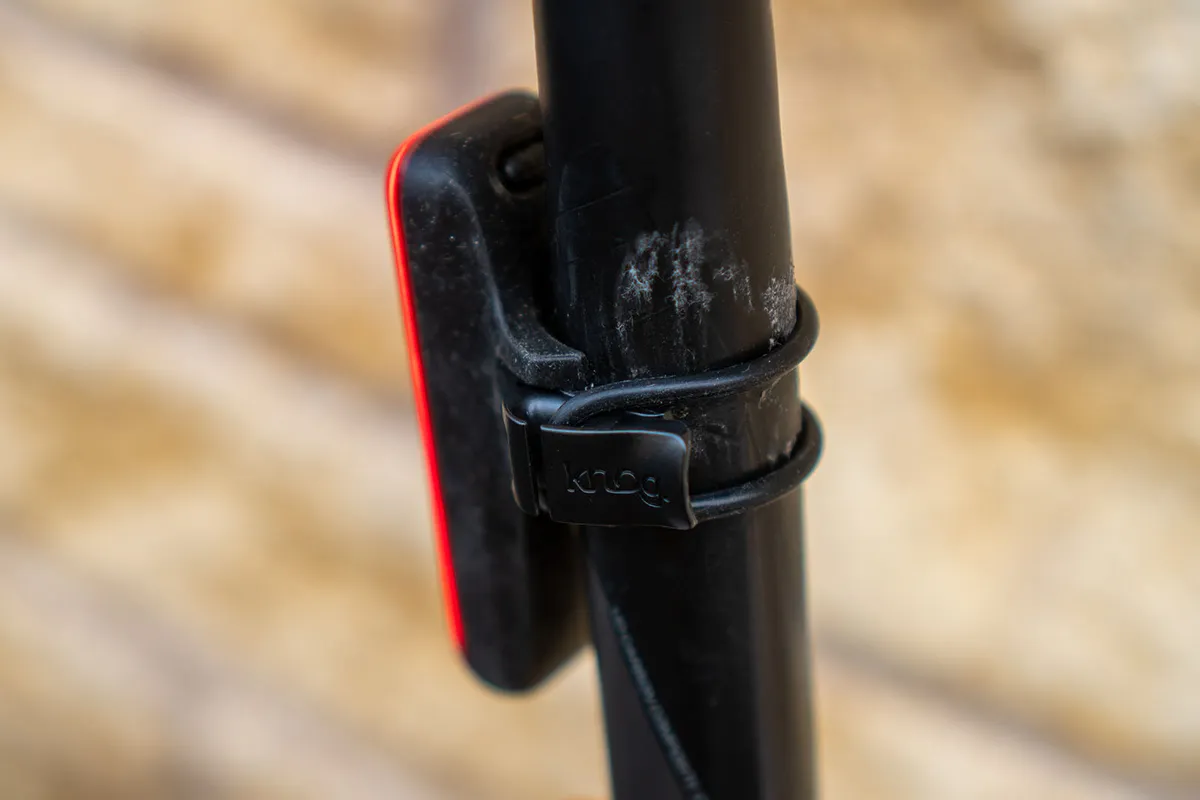
The Blinder V has a very similar body shape, and an identical charge and fastening mechanism, to the more powerful Blinder Road Rear 150.
This features a clasp, with a rubber band attached to it. This rubber band should stay permanently attached to the deep hook on one side of the light (unless you switch it for the two differently sized spares), while the clasp is used to attach the assembly to the moulded hook on the other side.
It’s an elegant solution, although the light design is not without drawbacks.
When fitted, the integrated male USB-A connector for charging lives under the clasp. It’s not sealed from the elements.
The power transfer strips rest against the seatpost when fitted, which opens up the clear possibility of corrosion and abrasion. Moreover, although the strips are safe if (when) they get wet, you’ll need to wait until they’re dry again before inserting the connector into a USB-A port.
The Knog Blinder V costs £44.99 / $49.95 / AU$74.99.
Knog Blinder V rear light performance
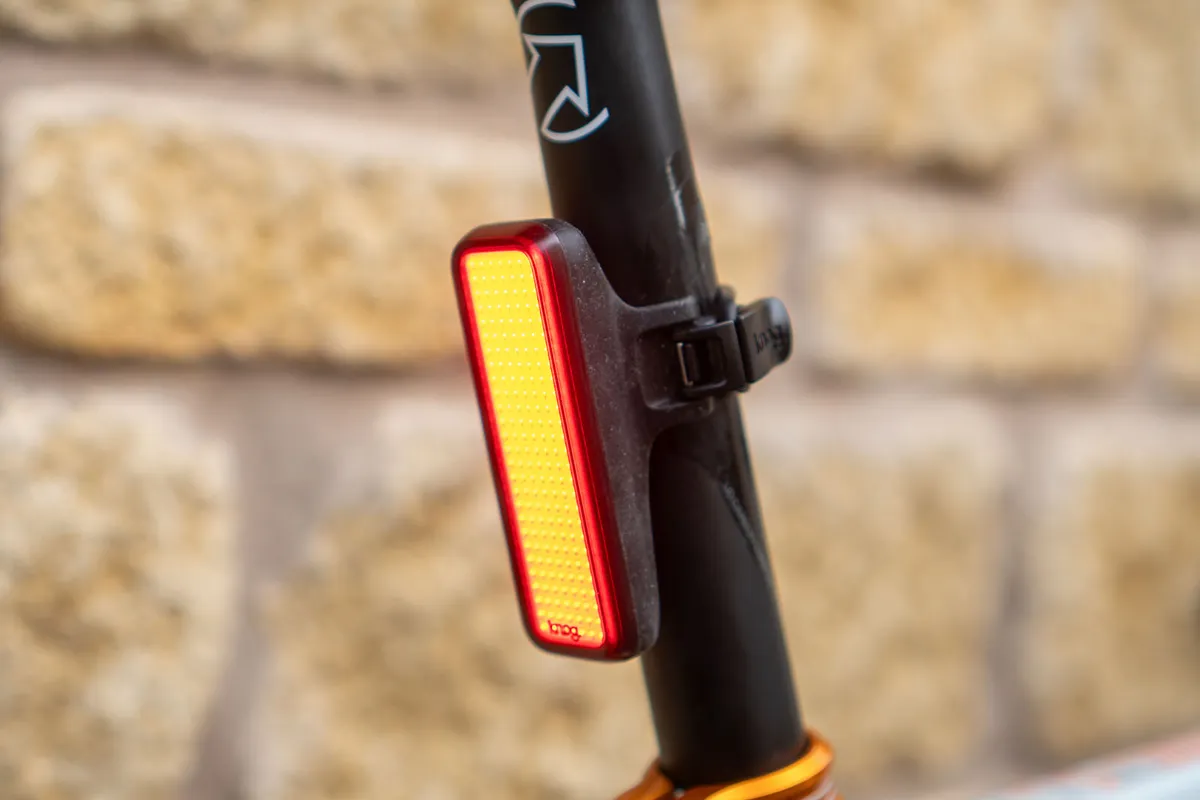
As a piece of design, the Knog Blinder V is an appealing light.
Its sleek low-profile form looks good on any bike, and I appreciate how it doesn’t stand out should I happen to ride my bike with it switched off.
My own bike has mudguards fitted, protecting the Blinder V from the majority of road spray and crud. However, when fitted to test bikes, that protection often doesn’t exist, giving rise to the high-abrasion situation I’ve referred to.
I’ve already noticed a couple of marks on the gold connector ports in my short test period.
It’s a shame that such a distinctive design feature has such a drawback for many riders, because for those who will only use the Blinder V on a bike with mudguards, it’s effective and performs well.
The functionality is simple, and while no one will ever need all eight of the modes on offer, they do at least offer the opportunity to settle on your preference between flashing, pulsing and sequential modes.
Given that the whole face effectively lights up, displaying a full board of light, I often used the brightest 30-lumen static mode because it appears more striking than the relatively modest lumen count on the box might suggest.
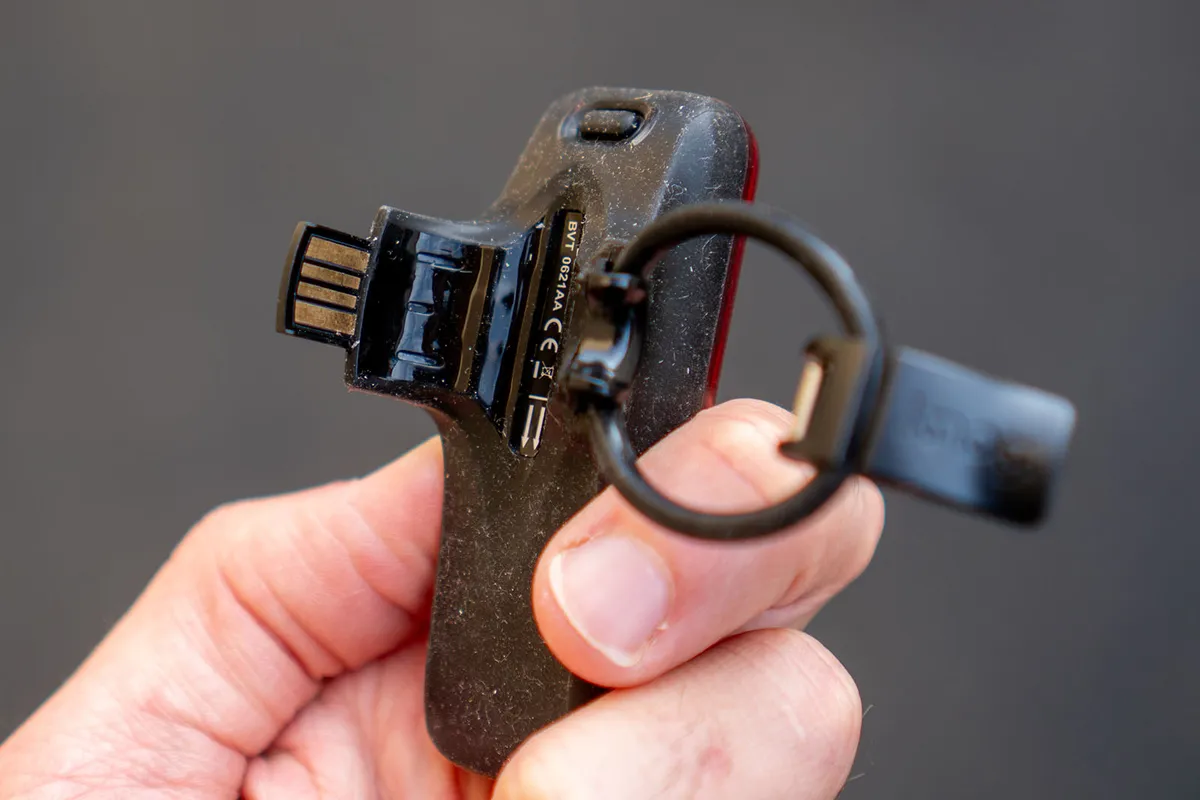
Otherwise, when I needed something akin to a day flash mode, I opted for the simple flash setting (90-lumen output), determining this was the most disruptive in brighter light conditions.
While underpowered compared to lots of the most powerful rear lights, the COB LED technology appears to make the most of every lumen, even if it lacks a true ‘day flash’ mode.
Battery life is outstripped by some of the best bike lights. Notably, where the Lezyne Strip Drive Pro 400+ Rear will last for over five hours at 80 lumens static, the Blinder V can put out 30 lumens for only 4 hours 41 minutes.
While this is likely enough for most riders, the need to recharge it more often than some other lights is worth bearing in mind (especially because you must remove it each time and plug it into a USB-A socket, which isn’t always immediately advisable if the contact point has become wet).
Happily, the light is easy to remove and refit, thanks to its clasp mechanism.
Knog Blinder V rear light bottom line
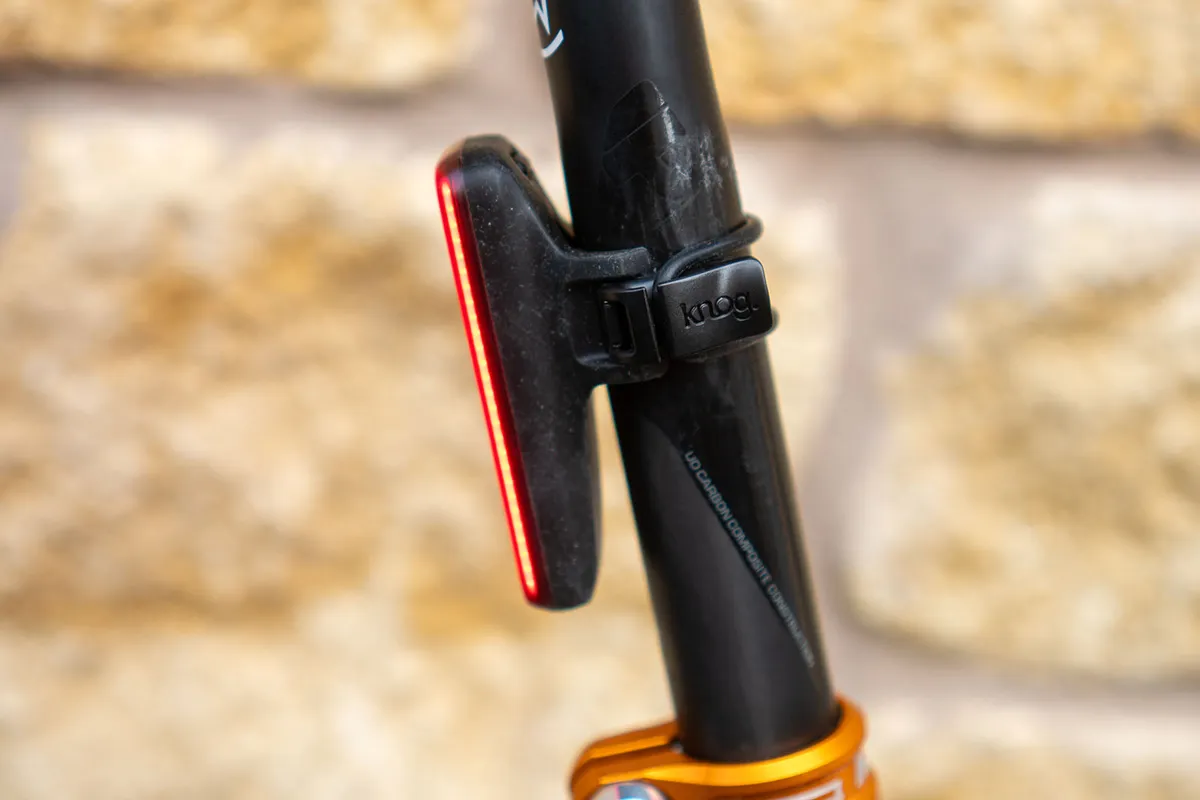
The Knog Blinder V is a light I consider a qualified purchase.
Fundamentally, it works well and is distinguished from most other lights thanks to its COB LED design. Fit it to your bike and it’ll help you be seen in all but the brightest light (for which a light with a dedicated day flash mode is arguably a better bet).
Those riders who put their rear lights through the worst conditions, exposing them to muck and spray, may be best advised to look elsewhere given the exposed nature of the USB charge connector. Meanwhile, battery life is acceptable, but falls behind some of the latest competitors.
But if a lighter-use rear light is what you need, and you appreciate a sleek design, the Blinder V is worth consideration.
Rear bike lights | How we tested
Rear lights are essential accessories. Legal requirements at night in the vast majority of territories, many also prefer to use them during the day, year-round, to boost their visibility.
For this test, carried out in autumn 2023 in the UK, we selected some of the latest rear bike lights for the road.
Testing included use as commuter lights and companions for longer weekend rides, as well as seeing use on owned and test bikes. A burn-time test was also carried out, using the most battery-intensive mode to give an indication of life. We suggest using this as a guide only.
Lights on test
- Lezyne Strip Drive Pro 400+ Rear
- Cateye Viz450
- Knog Blinder V
- Magishine SeeMee 300 Smart
- Ravemen TR500
- Moon Helix Max
Product
| Brand | Knog |
| Price | A$75.00, £45.00, $50.00 |
| Weight | 42g |
Features
| Light type | rear |
| Integrated battery | yes |
| Features | Modes: 8 Water resistance: IP67 |
| Output (lumens) | 100 |
